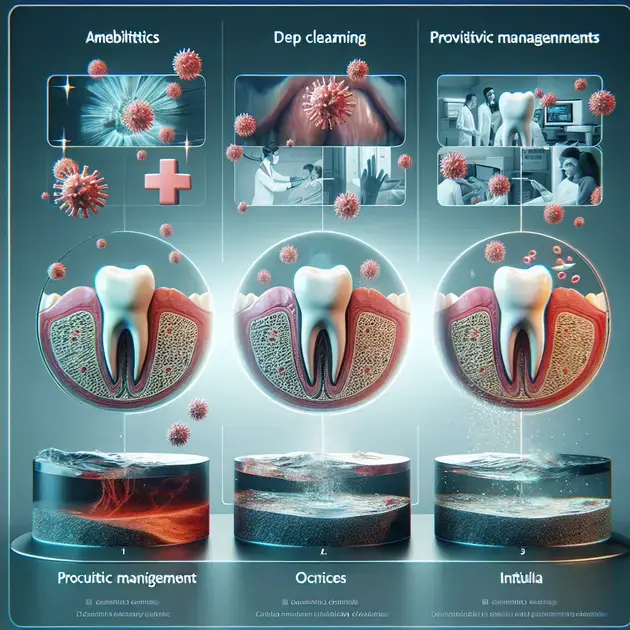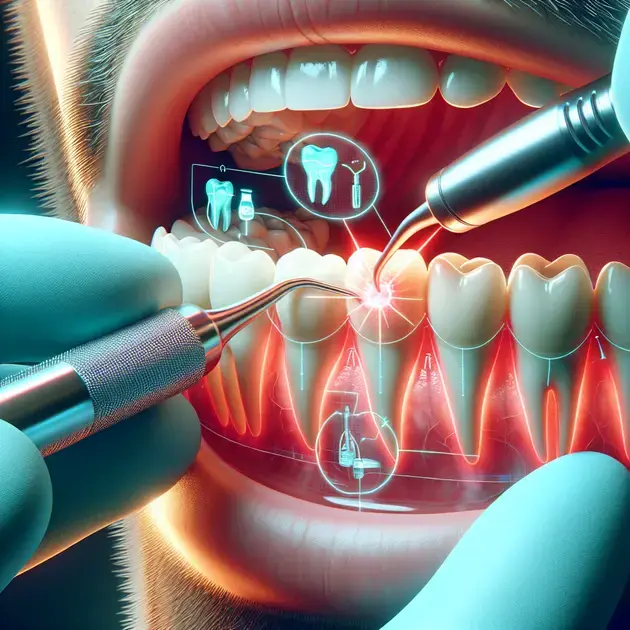Are you looking for effective medication for periodontitis? Look no further! This comprehensive guide will provide you with all the information you need to understand the available treatment options for periodontitis and make an informed decision about your oral health.
Recent studies have shown that utilizing a combination of antibiotics and deep cleaning techniques can significantly improve the outcomes of periodontitis treatment. By following the recommendations outlined in this guide, you can take proactive steps towards managing and treating periodontitis effectively.

Effective Treatment Options for Periodontitis
Periodontitis is a serious gum infection that damages the soft tissue and destroys the bone that supports your teeth. Without proper treatment, periodontitis can lead to tooth loss and other health complications. However, there are effective treatment options available to manage and control this condition.
Step 1: Professional Dental Cleaning
One of the first steps in treating periodontitis is to visit a dental professional for a thorough cleaning. This will help remove plaque and tartar buildup that contributes to gum disease. You can schedule an appointment with a dentist or a periodontist to have your teeth and gums cleaned professionally using specialized tools and techniques.
Step 2: Scaling and Root Planing
If your periodontitis is more advanced, your dental professional may recommend scaling and root planing. This deep cleaning procedure involves removing plaque and tartar from the root surfaces of your teeth and smoothing out rough spots to prevent bacteria from accumulating.
Step 3: Antibiotic Treatment
In some cases, your dentist may prescribe antibiotics to help control the infection and reduce inflammation. Antibiotics can be taken orally or applied directly to the affected area. Make sure to follow your dentist’s instructions carefully when taking antibiotics to ensure effectiveness.
Step 4: Surgical Procedures
If non-surgical treatments are not effective, your dental professional may recommend surgical procedures such as flap surgery or bone and tissue grafts to repair the damage caused by periodontitis. These procedures can help restore the health of your gums and supporting bone.
Understanding the Importance of Antibiotics
Antibiotics play a crucial role in the treatment of periodontitis by combating the bacterial infection that causes gum disease. Understanding the importance of antibiotics in managing periodontitis is essential for achieving successful outcomes in your treatment.
What are Antibiotics?
Antibiotics are medications that help kill or inhibit the growth of bacteria. In the context of periodontitis, antibiotics can target the specific bacteria that contribute to gum infection, helping to reduce inflammation and promote healing.
Types of Antibiotics
There are different types of antibiotics used in the treatment of periodontitis, including tetracycline, doxycycline, and metronidazole. These antibiotics can be prescribed in various forms such as pills, gels, or mouth rinses, depending on the severity of the infection.
Importance of Proper Antibiotic Use
It is important to follow your dentist’s instructions when taking antibiotics for periodontitis. Proper dosage and duration of treatment are critical to ensure the effectiveness of the antibiotics and minimize the risk of developing antibiotic resistance.
Combination Therapy
Sometimes, antibiotics are used in combination with other periodontal treatments such as scaling and root planing to optimize the results. This comprehensive approach helps address the infection from multiple angles, improving the chances of successful treatment.
Proactive Steps for Managing Periodontitis
Managing periodontitis requires a proactive approach to control the progression of gum disease and maintain oral health. By following these proactive steps, you can effectively manage periodontitis and prevent further complications.
Step 1: Daily Oral Hygiene
Practicing good oral hygiene habits such as brushing twice a day, flossing regularly, and using an antiseptic mouthwash can help remove plaque and prevent the buildup of bacteria that cause gum disease.
Step 2: Regular Dental Check-ups
Visit your dentist regularly for professional cleanings and check-ups. Your dentist can monitor the health of your gums, detect any signs of periodontitis early on, and provide timely treatment to prevent the condition from worsening.
Step 3: Healthy Lifestyle Choices
Adopting a healthy lifestyle that includes a balanced diet, regular exercise, and avoiding tobacco products can support your overall oral health and reduce the risk of developing periodontitis.
Step 4: Stress Management
Stress can weaken your immune system and make you more susceptible to gum infections. Practice stress-relieving techniques such as meditation, yoga, or deep breathing exercises to manage stress levels and promote oral health.

Understanding the Importance of Antibiotics in Periodontitis Treatment
Antibiotics play a crucial role in the treatment of periodontitis, a severe gum infection that can lead to tooth loss if left untreated. When bacteria build up in the gums, they can cause inflammation and damage to the surrounding tissues, resulting in periodontitis. Antibiotics work by targeting and killing these harmful bacteria, helping to reduce inflammation and prevent further damage to the gums and teeth.
One of the most effective antibiotics used in periodontitis treatment is metronidazole. This antibiotic is particularly effective against the bacteria that cause gum infections, making it a valuable tool in combating periodontitis. By taking metronidazole as prescribed by a dentist or healthcare provider, patients can help control the infection and promote healing in the gums.
In some cases, antibiotics may be prescribed in conjunction with other treatments, such as scaling and root planing, to further improve the effectiveness of the overall treatment plan. This combination approach can help address the infection from multiple angles, increasing the likelihood of successful treatment outcomes.
It’s essential for patients to follow their dentist’s instructions carefully when taking antibiotics for periodontitis. This includes completing the full course of antibiotics as prescribed, even if symptoms improve before the medication is finished. Failing to finish the antibiotics can lead to antibiotic resistance, making future infections harder to treat.
Overall, antibiotics are a valuable tool in the treatment of periodontitis, helping to control infections, reduce inflammation, and promote healing in the gums. When used in conjunction with other treatments and under the guidance of a healthcare provider, antibiotics can significantly improve the outcomes for patients with this serious gum condition.
Proactive Steps for Managing Medication Side Effects
When taking medications, it’s essential to be aware of and proactive in managing any potential side effects that may arise. By taking proactive steps, individuals can minimize the impact of side effects and ensure a more positive treatment experience. Here are some proactive steps to consider:
1. Communicate with Healthcare Providers
Openly communicating with healthcare providers about any known allergies, sensitivities, or previous adverse reactions to medications is crucial. By providing this information upfront, healthcare providers can make more informed decisions when prescribing medications, helping to reduce the likelihood of experiencing adverse side effects.
2. Monitor Symptoms Closely
Keeping a close eye on any changes in symptoms or new side effects that may arise while taking medication is important. By monitoring symptoms closely, individuals can promptly identify and address any issues that may occur, preventing them from escalating into more significant problems.
3. Follow Dosage Instructions Carefully
Adhering to the prescribed dosage and schedule for medications is vital for minimizing the risk of side effects. Taking medications as directed by healthcare providers helps maintain appropriate levels of the medication in the body, reducing the likelihood of experiencing adverse reactions.
4. Stay Hydrated and Maintain a Healthy Diet
Drinking an adequate amount of water and following a balanced diet can help support the body’s ability to process medications effectively. Staying hydrated and consuming nutrient-rich foods can promote overall wellness and potentially reduce the occurrence of certain side effects.
5. Report Any Concerns Promptly
If any concerning side effects or unexpected symptoms develop while taking medication, it’s important to report them to healthcare providers promptly. By addressing concerns early, healthcare providers can assess the situation and make any necessary adjustments to the treatment plan to ensure the individual’s safety and well-being.
Maximizing the Effectiveness of Non-Surgical Periodontitis Treatments
Non-surgical treatments are a common approach for managing periodontitis, a serious gum infection that can lead to tooth loss if left untreated. By maximizing the effectiveness of non-surgical treatments, individuals can promote healing in the gums, reduce inflammation, and prevent further damage to the teeth and surrounding tissues. Here are some strategies for optimizing the outcomes of non-surgical periodontitis treatments:
1. Consistent Oral Hygiene Practices
Maintaining a diligent oral hygiene routine is essential for supporting the effectiveness of non-surgical periodontitis treatments. Brushing and flossing regularly can help remove plaque and bacteria from the teeth and gums, reducing the risk of infection and inflammation.
2. Follow-Up Care and Monitoring
Attending follow-up appointments with a dentist or periodontist as recommended is crucial for monitoring progress and addressing any concerns that may arise during treatment. Regular check-ups allow healthcare providers to assess the effectiveness of the treatment plan and make any necessary adjustments to optimize outcomes.
3. Lifestyle Modifications
Implementing positive lifestyle changes, such as quitting smoking, maintaining a balanced diet, and managing stress, can enhance the effectiveness of non-surgical periodontitis treatments. These modifications can support overall oral and systemic health, contributing to improved treatment outcomes.
4. Supportive Therapies
Incorporating supportive therapies, such as antimicrobial mouth rinses or locally applied antibiotics, can complement non-surgical treatments for periodontitis. These additional interventions can help target bacteria in hard-to-reach areas and enhance the overall effectiveness of the treatment plan.
5. Compliance with Treatment Recommendations
Following the treatment recommendations provided by healthcare providers, including taking prescribed medications and adhering to post-treatment care instructions, is essential for maximizing the effectiveness of non-surgical periodontitis treatments. Compliance with the treatment plan can help promote healing, reduce inflammation, and prevent the progression of gum disease.
Conclusion
Understanding the importance of antibiotics in periodontitis treatment is paramount for combating this severe gum infection effectively. Antibiotics play a crucial role in targeting and killing harmful bacteria, reducing inflammation, and preventing further damage to the gums and teeth. Specifically, metronidazole stands out as one of the most effective antibiotics in fighting gum infections, promoting healing when taken as prescribed under professional guidance.
Additionally, proactive steps for managing medication side effects are essential for ensuring a positive treatment experience. Communicating openly with healthcare providers, closely monitoring symptoms, following dosage instructions, staying hydrated, and promptly reporting any concerns are key strategies to minimize adverse effects and optimize treatment outcomes.
Maximizing the effectiveness of non-surgical periodontitis treatments involves consistent oral hygiene practices, regular follow-up care, lifestyle modifications, supportive therapies, and compliance with treatment recommendations. By implementing these strategies, individuals can enhance healing in the gums, reduce inflammation, and prevent further damage to the teeth and surrounding tissues, ultimately improving the overall efficacy of non-surgical treatments for periodontitis.



